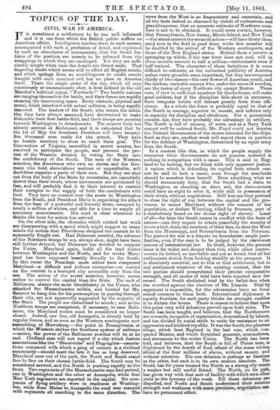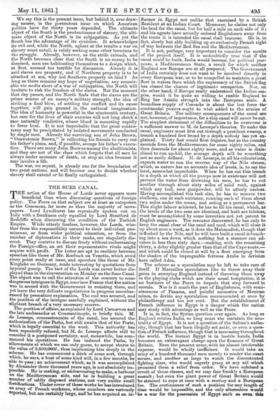TOPICS OF THE DAY.
CIVIL WAR IN AMERICA.
TTis sometimes a misfortune to be too well informed, and it is one from which the British public suffers on American affairs. Intelligence reaches them in such masses, accompanied with-such a profusion of detail, and explained by such an abundance of commentary, that the broad fea- tures of the position are scarely to be released from the wrappings in which they are enveloped. Yet they are suffi- ciently simple when once the details are thrust aside. That lingering doubt which seems still to affect all English minds, and which springs from an unwillingness to credit events fraught with such unmixed evil, has no place in America itself. There the single order of the day, which all men consciously or unconsciously obey, is beet defined in the old Marshal's habitual signal, " Forwards!" Two hostile nations are-ranging themselves for battle, and-their forces are rapidly crossing the intervening-space. Every obstacle, physiaal and moral, which interfered with actual collision, is being rapidly removed. The leaders of the South, who retain the initia- tive they have always assumed, have determined to make Golumbia their first •battle-field, and their troops are pouring towards Washington in detachments. The nearest body has already Arrived at Richmond, and it is calculated that by the 1st of May the Southern President will have twenty- five thousand men ready for the attack. They have no hostile territory to cross to reach their goal. The Convention of Virginia, assembled in secret session, has resolved to anticipate the people, and prevent the pro- test of the Western division by voting the State into the confederacy of the South. The men of the Western counties, the Americans who own no slaves, and the Ger- mans who hold. slave-labour noxious or unprofitable, will doubtless organize a party of their own. But they are shut out from the body of the State by mountains, are essentially slower than their -rivals, whose movements are quickened by fear, and will probably find it to their interest to restrict, their energies to the supply of both the combatants with food. They have no control over the route to Washington. from the South, and President Davis is organizing his attack from theimse of a powerful and friendly State, occupied by nearly a million of whiten, and able for a time to supply all necessary commissariat. His road is clear whenever he thinks the hour for action has arrived.
On the other side, the obstacles which existed last week are disappearing with a speed which might suggest to many minds the notion that Providence designed the contest to be minimally fought out. Had Delaware seceded, the advance of the Northern troops by sea, always slow, might have been still further delayed, but Delaware has decided to support the Union. Maryland again, horde all the land routes between Washington and the North, and for weeks Mary- land has been supposed •heartily friendly to the South. In this event the President must either have- conquered Maryland—,a difficult and tedious enterprise—or carried 0.1 1 the contest in a besieged city accessible only from the sea. The action of the secret societies, however, seems rather to control the -capital than the State. The mob of Baltimore, always the most bloodthirsty in the Union, •who ,attacked the Massachusetts militia, and hunted for Mr. .Sumner to hang him for hispresumption in passing through their city, are not apparently supported by the majority of the State. The people are disinclined to secede ; and as the Northern -troops are competent, if necessary, to raze Balti- more, the Maryland routes must be considered no longer closed. Indeed, one line, yid Annapolis, is already held by regular forces, and as soon as the Western contingents now assembling at Harrisburg —the point in Pennsylvania at which the Western strikes the Southern system of railways —arrive, the power of the Baltimore rowdies will be at an end. Civilized men will not regret if a city which fosters associations like the "Blood-tubs" and Plug-uglies—associa- tions compared with which a gang of coiners is a civilized eommunity—should meet the fate it hap so long deserved. Maryland once out of the path, the North and South stand face to face on their chosen battle-field. The South may be considered arrived, and the North is pushing rapidly to the front. Two regiments of the Massachusetts men had arrived, -one in Washington and the other at Annapolis, while four New York regiments are reported in the capital. Six com- panies of flying artillery were in readiness at Washing- ton, while from Maine to Annapolis the road was strewed with regiments all marching in the same direction. The news from the West ie -se fragmentary and uncertain, and all the facts indeed so obscured by clouds of enthusiasm and grandiloquence, that an accurate estimate-of Northern num- bers is not to be obtained. It would seem certain, however, that Pennsylvania, New Jersey, Rhode Island, and New York —the states nearest the scene of action—will have thirty thou- sand men in the field in good time, while this number will be doubled by the arrival of the Western contingents, and those of the New England states. Behind, them a reserve is springing up which, if the war fever does not cool, will in three months amount to half a million—enthusiastic even if half trained. The character of these battalions it is more difficult to estimate, as the unlimited publicity of America makes every grumble seem important, but they are composed chiefly of two classes—the very flower. of American youth, and the lawless, excitable scamps who, under the name of rowdies, are the terror of every Northern city except Boston. These men, if shot in sufficient numbers for disobedience, will make good soldiers, but if the discipline falls short in sternness, their irregular habits will detract greatly from their effi- ciency. As a whole the force is probably equal to that of the South in courage, superior in morale, and inferior only in capacity for discipline and obedience. For a permanent contest, too, they have probably the advantage in artillery.
The North is full of cannon, of sorts, and as a Navy Yard cannot well be ordered South, Mr. Floyd could not deprive the Federal Government of the stores intended for the ships.
Such as they are, another week will report them in position for the defence of Washington, threatened by an equal army from the South.
In a contest like this, in which the people supply the resources their Governments do not possess, materiel is nothing in comparison with a cause. This is said in Eng- land to be lacking, but we think with only apparent justice. A nation which is defending its capital from attack can- not be said to lack a cause, even though the assailants should be seceders from herself. Even admitting, what we should strenuously deny, that the South had a claim to Washington, as standing on slave soil, the slave-owners could have no right to seize it, while still in possession of their rivals, without negotiation. Still less can they pretend to close the right of way between the capital and the pro- vinces, to annex Maryland without the consent of her population, or declare Wheeling, tilled by freemen, part of a confederacy based on the divine right of slavery. Least of all—for here the South comes in conflict with the facts •of nature—can they expect to retain peacefully the mouths of rivers which drain the territory of their foes, to •shutthe West from the Mississippi, and Pennsylvania from the Potomac. The pretext for war is a dispute on boundaries-: ample justi- fication, even if the case is to 'be judged by the narrowest canons of international law. In truth, however, the present issue is far wider and deeper than this, while other contro- versies lie behind, so inevitable and yet so broad, that all but enthusiasts shrink from looking steadily at the prospect. It is absolutely essential, not to this or that settlement, but to any settlement whatever of the existing contest, that the two parties should comprehend their precise comparative strength, and all modes of trial have been, rejected save the sword. The South abolished trial by the ballot-box when she revolted against the election of Mr. Lincoln. Trial by argument is impossible, for the adversaries have no locus standi common to them both. International diplomacy is equally fruitless, for each party thinks its strength enables it to dictate the terms. There is reason to believe that upon this point very wild delusions prevail upon both sides. The South has been taught, and believes, that the Northerners are cowards incapable of organization, demoralized by labour, and too divided by social strife to unite for resistance to an aggressive and kindred republic. It was the South, the planters allege, which beat England in the last war, which con- quered Mexico, and which furnished generals, commodores, and statesmen to the entire Union. The North has been told, and believes, that the South is full of Union men, is frightened by the dearth of food, afraid of the mean whites, Afraid,of the four millions of slaves, without money, and without cohesion. The one delusion is perhaps as baseless as the other, but each is in its own section absolute. The 'South has for years treated the North as a strong ally treats a weaker but still useful friend. The North, on its part, has given way with that sort of facility with which men often yield to the tyranny of the weak. Till these delusions are dispelled, and North and South understand their relative strength and weakness with some precision, negotiation can have no permanent effect. We say this is the present issue, but behind it, ever draw- ing nearer, is the portentous issue on which American politics have for thirty years depended. The ultimate object of the South is the predominance of slavery, the ulti- mate object of the North is its subjugation. As yet the South has the advantage of its cynicism. It acknowledges its evil end, while the North, aghast at the results a war on slavery must entail, is vainly seeking some other terminus to the struggle. Already, however, as the strife extends, and the North becomes clear that the South is no enemy to be despised, men are habituating themselves to a design which, at first, seemed too terrible for discussion. Already it is said slaves are property, and if Northern property is to be attacked at sea, why not Southern property on land ? As long as there remains any hope of negotiation, any conceiv- able via media short of a war of subjugation, the North will hesitate to risk the freedom of the slaves. But the moment that day passes, and the North finds that the slaves are the prime source of an enemy's military strength, the idea of striking a final blow, of settling the conflict and its cause together, will gain ground in the national imagination. The idea of humanity is powerful in the nineteenth century, but care for the lives of their enemies will not long check a race naturally vindictive, whose blood is mounting rapidly to fever heat. It is not improbable that the great contro- versy may be precipitated by isolated movements conducted by single men. Already the surviving son of John Brown, `c Osawatomie Brown," is collecting his friends to carry out his father's plans, and, if possible, avenge his father's execu- tion. There are many John Browns among the abolitionists, and they are not of the class which forgets that all men lie always under sentence of death, or stop an idea because it may involve a life.
The war, we repeat, is already one for the boundaries of two great nations, and will become one to decide whether slavery shall extend or be finally extinguished.































 Previous page
Previous page